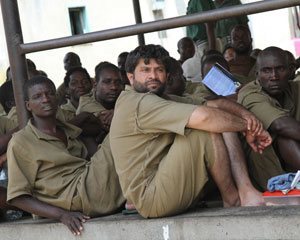
Death row inmate Cuthbert Tapuwanashe Chawira says he has lost contact with his wife.
BY VENERANDA LANGA
In his founding affidavit provided by Veritas, Chawira sentenced to death for murder 15 years ago, said that the long incarceration on death row meant complete loss of family contacts for many prisoners in his situation. Chawira said he lost his wife to other men as it was clear that he was never to come out of prison. “I can confirm that I am married with a wife who has since moved on, and I have three children, the oldest who is 19 years old,” he said.
“Being in prison as well puts a toll on members of our families. In my case my wife left and only my children come to visit me, and only on holidays. I must say that we are allowed visitors for a duration of 15 minutes each after every two weeks,” he said.
However, Chawira said for most death row prisoners, their families had already abandoned them and forgotten that they ever existed.
“But, most of us [death row prisoners] do not receive visitors. Society has written us off and no one considers us human beings. We are the hidden sore of a very conflicted society. We are not normal people and the only thing that has kept us going is the fact that we have all converted to Christianity and survive by praying and the faith that only our Lord will save us,” he said.
Chawira said to comfort themselves as they were now outcasts, abandoned by family members and facing death, they sought solace from their favourite verse, Isaiah 43 verse 25 which reads, “I, even I, am he who blots out our transgressions, for my own sake, and remembers your sins no more.”
Another death row prisoner Emmanuel Dolosi (47) also mentioned his family.
- Chamisa under fire over US$120K donation
- Mavhunga puts DeMbare into Chibuku quarterfinals
- Pension funds bet on Cabora Bassa oilfields
- Councils defy govt fire tender directive
Keep Reading
“I am a married man with four children, but one is deceased,” Dolosi said in his founding affidavit. “There is nothing as challenging to a human being as living a life without hope. Most of us have no hope that we will live and we are just sitting in the dark waiting to be executed. The greatest suffering of a death row prisoner is psychological, severe paranoia, psychiatric and bipolar challenges,” Chawira said.
“The majority of us have been on death row for periods that range from four to 18 years. It is our contention that subjecting us to such lengthy periods on death row, results in permanent stress, constant fear resulting in extreme physical, psychological and emotional harm.”
All of the 74 death row inmates in the country, including Chawira and Dolosi, admitted that they had committed grievous crimes of murder and hurt people, adding they were sorry for their sins.
“I want to make it clear to this honourable court [Constitutional Court] that this application in no way seeks to undo the grave effects and consequences to innocent persons of the crimes we were convicted of,” Chawira said. “In this regard, I want to apologise for the pain we have caused and the crimes, we have committed. However, I wish to restate that despite the commission of these crimes we are still human beings and we are entitled to the enjoyment and protection of Zimbabwe’s laws and indeed the constitution. Section 2 of the constitution makes it clear that it is the supreme law of the country.”
The death row inmates continue to keep their hopes to life on the premise that soon the country’s laws might be aligned to the constitution which says every person has a right to life.
The death row prisoners reminded Vice-President Emmerson Mnangagwa, in charge of the Justice, Legal and Parliamentary Affairs Ministry, that he was also once on death row himself and knew of the filthy, dirty and disease-infested conditions of Zimbabwe’s prisons.
They said the prisons needed to be improved in line with international human rights treaties that Zimbabwe was signatory to.
“I am fully aware that the first respondent [Mnangagwa] in his personal capacity knows and has experienced the inhumane and degrading status quo of having to wait on death row. “In the 1960s he was sentenced to death, and was only saved by virtue of his age. He is familiar with the death row phenomenon, and the death row syndrome. His testimony and experience is more horrendous than ours,” Chawira’s affidavit reads.
But founding affidavits by legal experts Veritas for two death row prisoners, who are battling the government to revoke their sentences to life imprisonment, revealed that condemned inmates long for family connection and occasionally want to be visited.
Veritas, among many organisations in Zimbabwe, has been advocating for amendments of the Criminal Procedure and Evidence Act relating to the death penalty and the Criminal Law Code (Section 20) for them to be in line with Section 48 of the constitution stipulates that every person has a right to life.










